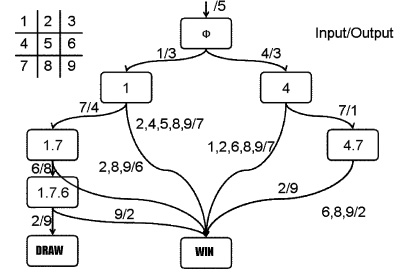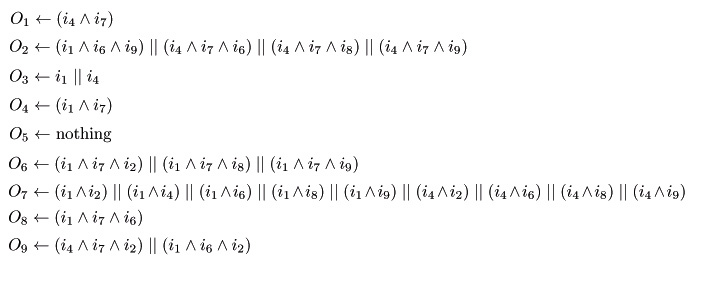Tokyo Alliance: Design/Method
From 2006.igem.org
(Difference between revisions)
| Line 14: | Line 14: | ||
[[Image:tokyo_statetransition.jpg|frame|State Transition Diagram]] | [[Image:tokyo_statetransition.jpg|frame|State Transition Diagram]] | ||
| + | *Combination of Noughts-and-Crosses | ||
| + | **362,880(=9!)[patterns] sum up all patterns | ||
| + | **255,168 As a game | ||
| + | **26,830 Eliminating symmetrical pairs | ||
| + | |||
| + | Well, still impossible to make, isn't it? | ||
| + | |||
| + | So, we added the following rules to reduce the number of transition functions (and inputs). | ||
| + | |||
| + | ; 1st : SYANAC goes to the center of the board. (No.5) | ||
| + | ; 2nd: Human goes to the specific corner(No.1) or the edge(No.4) of the board. | ||
| + | |||
| + | Thanks to this rules, | ||
| + | |||
| + | **25 Eliminating symmetrical pairs [SYANAC] | ||
====Logic Gates==== | ====Logic Gates==== | ||
Revision as of 17:09, 16 October 2006
Contents |
Systematic design concept/method
Abstract Level
State Transition Diagram
- Combination of Noughts-and-Crosses
- 362,880(=9!)[patterns] sum up all patterns
- 255,168 As a game
- 26,830 Eliminating symmetrical pairs
Well, still impossible to make, isn't it?
So, we added the following rules to reduce the number of transition functions (and inputs).
- 1st
- SYANAC goes to the center of the board. (No.5)
- 2nd
- Human goes to the specific corner(No.1) or the edge(No.4) of the board.
Thanks to this rules,
- 25 Eliminating symmetrical pairs [SYANAC]
Logic Gates


